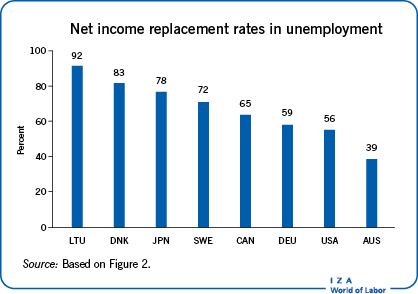Elevator pitch
All developed economies have unemployment benefit programs to protect workers against major income losses during spells of unemployment. By enabling unemployed workers to meet basic consumption needs, the programs protect workers from having to sell their assets or accept jobs below their qualifications. The programs also help stabilize the economy during recessions. If benefits are too generous, however, the programs can lengthen unemployment and raise the unemployment rate. The policy challenge is to protect workers while minimizing undesirable side effects.

Key findings
Pros
By replacing some lost income, unemployment benefits protect unemployed workers from depleting their assets to maintain consumption.
By augmenting the income of very low-income households, unemployment benefits help keep them out of poverty.
Unemployment benefit programs encourage workers to accept jobs that are important to the economy, despite layoff risks.
Unemployment benefits enable workers to maintain consumption while spending more time searching for a job fitting their skills.
Unemployment benefits provide additional support to workers during recessions, without large negative side effects.
Cons
Unemployment benefit programs can lengthen unemployment spells excessively, especially when maximum benefits continue over long periods.
Unemployment benefit programs modestly raise the national unemployment rate—and by less during recessions.
There is mixed evidence that unemployment benefit programs help people find better paying jobs or jobs better matched to their skills.
Without official monitoring, unemployed workers might exaggerate their job search activity and so may stay unemployed longer.
Unemployment benefit systems financed by payroll taxes may vastly increase layoffs in some industries.